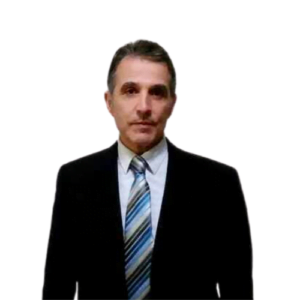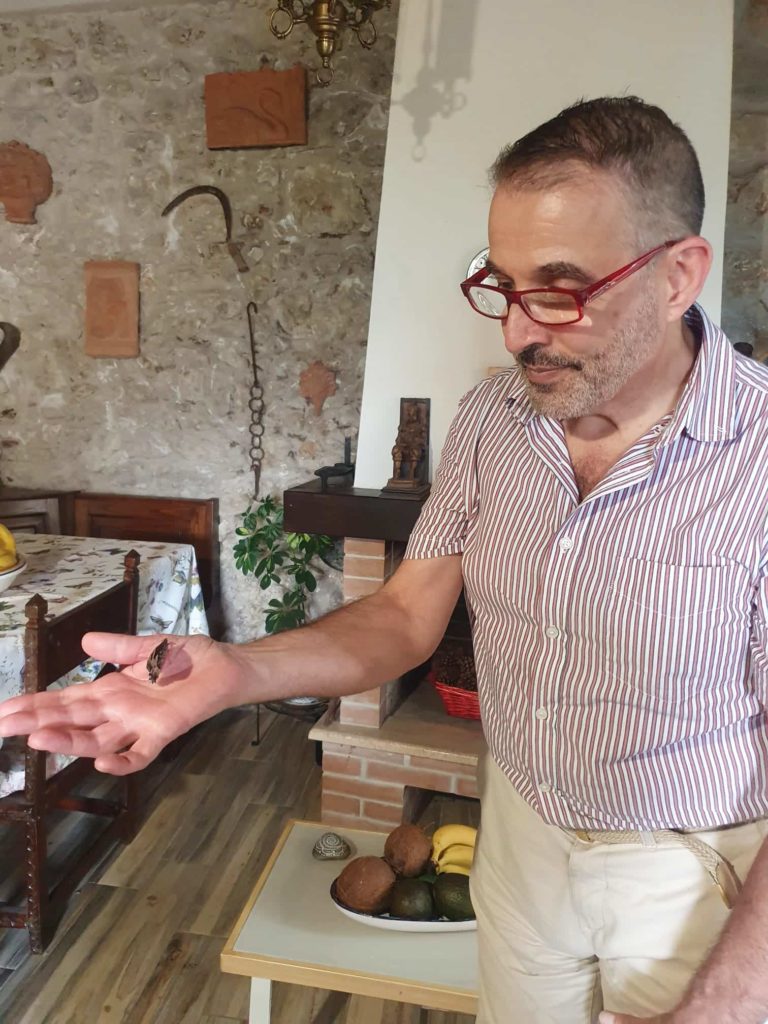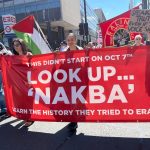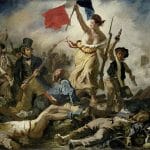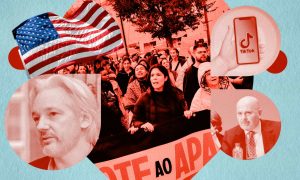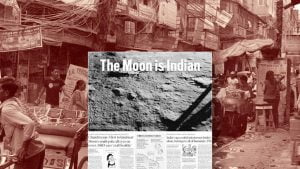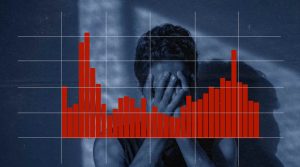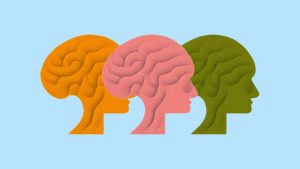“Disaster… it could happen to anyone.” Think about it too much and you will go mad: that endless list of slings and arrows. Yes, it could happen to anyone, but it is best to plod along as though it could never happen to us. Perhaps they deserved it. Karma. Their suffering is like a parallel universe: it need never touch us… Then, out of the blue, or through a slow and inevitable twist of events, it does.
It was about 15 years ago. I don’t remember for certain, and I don’t particularly care to. Mine was that slow and inevitable twist of events that feels like a drawn-out present moment that is impervious to change. You are no longer a free agent, but a spectator in your own demise, like a character in a well-orchestrated renaissance painting; not quite the three stages of man, though certainly a pastiche of different moments in time.
I was living in a maison de maître in the south of France with my wife and four children while working in and commuting home from London. My pied-à-terre in England was a little boat moored where the Thames meanders around Runnymede Park, famous as the place where the Magna Carta was signed in 1215. The sense of history and the natural beauty of the place made up for my crammed and damp quarters; and of course, my true home was always within reach.
Then the Italian consulate in London refused to renew my passport. It had been issued in France and had to be renewed there, they said. The bureaucratic charade that followed became a circus of Kafkaesque proportions, the outcome of which resulted in my being stranded in England for six months. By the time my passport finally did get renewed, my situation had taken a drastic turn for the worse. After living in France for 14 years, my wife suddenly decided she no longer wanted to live there, but she was not prepared to wait until our house was sold. Despite my pleas and warnings that I would not be able to continue paying the mortgage and support her in England or Malta, which were her preferred choices, she upped and left for Malta. The chaos that ensued resulted in our separation (and eventual divorce) and my struggling to pay the mortgage and give her enough money to maintain herself and the children in Essex, which was where she had now moved to. It was a losing battle.
The boat, a 24-foot cabin cruiser, was now my permanent home as I could not afford to go back and forth from England to France. The situation started to go from bad to worse and it became so dire I used to steal the dry bread my friend used to bring for the ducks and I would walk for miles to save on public transport costs.
After a year or so of hell, I reached a point where I could no longer cope.
I sold the boat, left my job as a training manager and went to stay with a relative in Canada who reassured me that finding work there would not be difficult. As it happened, it was difficult and after trying for a few months I was running out of the little money I had. I realised that before long I would be penniless and would no longer be able to honour any of my commitments. I had persevered until the bitter end, so by the time I boarded a plane back to London, I was destitute. I was a lot worse off than when I had left, so seeking help from family or friends seemed pointless. I felt I only had two options: giving up, or living on the streets. Not being very adept at the former alternative, I chose the latter.
I spent my first night in England in a lovely seafront hotel in Hastings preparing for the battle ahead. The next evening, I returned to London where I met my ex-girlfriend and entrusted her with my laptop. It is not that I really hoped to see it again, but I couldn’t just throw it in any old bin. She was aware of my determination, so she did not try to talk me out of it. She gave me £20 which was a small enough amount for me to accept. After we parted, I walked to Soho Square and dumped the stuff I did not need, or could not carry, in a skip there. At that precise moment, as the lid came down, I heard the door of my past slamming behind me. My privileged upbringing, my years of study, my successful career, my family and friends. Bang! Gone! I was a vagrant. My history did not matter. Henceforth it would be my status that would define me.
The first night was not that bad. I used to roam the streets occasionally at night in the past in order to save hotel bills prior to my buying the boat. In those days I used to work in social care and my job involved sleeping at work regularly, so staying at a hotel occasionally was cheaper than renting a place, although I could not always afford to do so. The only difference was that I was now carrying all my belongings on my back and no hope in my heart. The first day, however, was awkward, surreal even. I did not know what to do with myself. The world was spinning, but I was standing still.
After a few days I found some sort of routine: I would walk the busiest streets at night and, weather permitting, I would sleep in a park during the day trying to seem as casual as a tourist. I would also scan the pavements for discarded travel cards which, when found, would allow me a few hours’ sleep on the night busses and the underground trains until around midnight.
The busses would travel to remote dark suburbs and I would get off a few stops before the terminal and take the next bus back.
It was strange not knowing where I was, but stranger still was the fact that it did not matter. The chances of finding a travelcard faded as the stations closed. Then, exhausted from having gone from one distant station to another, I would have to resign myself to walking all night and trying to look as “normal” as possible. This was not simply pride, though it was that too. Vagrancy is illegal in England and the police could stop you and give you a rough time, which they did on a couple of occasions. If you happen to be homeless, you are expected to be bodiless as well. You are meant to disappear into the ether.
Of course, I would look for money too. I had not bothered with social security benefits, so I had to survive on what I found. The best place to find money was around the trees in the big parks as people would sit by the trees and coins would sometimes slip out of their pockets. Finding money was most welcome, but discarded food was easier to come by as certain shops and eateries would regularly discard their out-of-date food at the end of the day. Some, like EAT, would do so carefully to assist those who depended on it, while others seemed to go out of their way to make sure that it was mucked up or unobtainable. I was not a vegan then, but being vegetarian still made finding food a lot harder. The little money I would find I would use for cheap food, toiletries and washing my clothes at launderettes. Around that time, McDonalds had a promotion going whereby collecting six tokens would entitle you to a free coffee. The tokens were affixed to the McDonalds’ paper cups, as were the little pads to stick them on, and finding enough of these was such a treat: a hot coffee and a nice warm place to sit and drink it. My other luxuries were visiting libraries and museums and attending free recitals in various churches.
Before I left Montreal, I had bought an excellent French translation of the Ramayana. It was a great solace to me when living on the streets partly because it spoke of exile and purpose. As I finished reading the last page, I went straight back to the beginning and started reading it all over again. I was at home in the company of Lakshmana, Hanuman and Sita, and I felt more real in their world than my own. The characters of this epic were my only friends at first, but eventually I did make a friend, a real one, so to speak…
Trying to keep clean was my main concern. I was not satisfied with the “lick and a promise” I could give myself in the public toilets and took to swimming in the Serpentine at about five in the morning and using the open-air shower there. It was damn cold, even though it was spring, but it was well worth it. I would then wait for the public toilet there to open as it was one of the first to do so. That is where I met Kevin. He was half stripped and was unashamedly giving himself a good wash. He was well-built, with jet black hair, but his pale body gave him an aura of fragility. His main expression was one of Pre-Raphaelite wonder. “Is it me, or is it colder than usual today?” He asked the question to no one in particular, but seeing as I was thinking the exact same thing as I was brushing my teeth a few sinks away, I heartily agreed with him, before disappearing into the park soon after. There was a certain synchronicity between us and we kept bumping into each other again and again, so it is not surprising that we became close. He was an artist from the north of England, but had to go into hiding after having testified against a drug gang. Unlike me, Kevin was receiving some benefits, so even though he was homeless he had a meagre but steady income that he would sometimes use to treat me to the occasional surprise, such as a bottle of brandy or some other goodies.
Sleeping rough with company did not feel as bad
We often passed the night together and he would even share his sleeping bag with me when it was very cold. We rarely arranged to meet, but despite the vastness of the city, our paths often crossed. We used to love talking about all sorts of things together and sometimes we would take each other to visit some of our favourite spots. One of mine was the Church of the Immaculate Conception in Mayfair. Visiting the Tate Modern with him was a real treat as he knew a lot more about modern art than I did and he could talk about artists like Joseph Beuys and Antony Gormley with such contagious enthusiasm that he came across as an artistic wonder himself.
Even though I do not follow any particular religion, I have always been open to the symbolism of all of them and I believed that my fortieth day on the street would bring me some sort of revelation. However, it turned out to be a day like any other, though perhaps one of the hardest once I began to realise that it was just another day that would be followed by a string of equally unremarkable ones. I therefore decided that perhaps the message was that I had to swallow my pride and apply for benefits and social housing. That, therefore, is what I did. Nevertheless, after jumping through various hoops like a circus animal, I was told that seeing as I owned a house in France, I would not be entitled to anything (despite having paid tens of thousands of pounds in income tax).
As the days went by, I felt as though my clothes started to look worn and seeing I got caught in the rain a few times too many, the contents of my backpack, which mainly consisted of clothes and some heavy manuscripts of a philosophical language I had been working on, started to smell like a wet dog. I had also lost some of my stuff, like my spare pair of shoes, when the bush I had hidden them under (in order to ease the load I was carrying around with me) ended up getting trimmed and tidied. I began to realise that maintaining my dignity would become harder and harder as the little I had began to fall apart. Not long after I had arrived in Canada, I dreamt that I looked in the mirror and instead of seeing myself in the reflection, I saw the worn-out face of a tramp grinning cynically at me. With all the good will in the world, I began to realise that I could not escape him. Destitution takes its toll.
Before I had embarked on my exile, I had written to my ex explaining what I would be doing and I had said that I would be contacting her in three months’ time in case she would need me to sign any papers for the eventual sale of the house. After that I turned my mobile phone off and remained completely incommunicado. When the three months were up, I turned my phone on again. The house had not been sold and my ex berated me for the tough times they had gone through. I think I just hung up on her. Going through my messages, though, provided a ray of hope. One of the employment agencies I used to use when I worked freelance had recently sent me information on a social work job they thought would interest me. The job paid well and included accommodation. I applied and called my old friend to help me make myself presentable for the interview. He picked me up near Hyde Park and though I did not end up getting that job I was soon offered another and gradually got back on my feet.
I never saw Kevin again, though I did look for him a couple of times. The synchronicity was gone, it would have been impossible to find him. I was like Enkidu after having been touched by “civilisation”. Part of my magic was lost forever. Part, but not all; and the scars: they too remain. I still regularly dream I am lost in worlds that I cannot even recognise; that I have to move on, without there being anywhere for me to go. In some ways the experience was liberating, as are the dreams.
One thing is certain: society did not help me. Quite the contrary, it made my very existence an illegal act. This is not what society is meant to be, though many of us are happy to leave things as they are. I am not one of those and I will do everything in my power to bring some positive change to this propensity to look the other way while disaster touches those within our reach. I look forward to the day when UN-aligned will be powerful enough to bring some meaningful change to this dull world that is caught in a rut.
• In the UK and Ireland, Samaritans can be contacted on 116 123 or email [email protected] or [email protected]. In the US, the National Suicide Prevention Lifeline is 1-800-273-8255. In Australia, the crisis support service Lifeline is 13 11 14. Other international helplines can be found at www.befrienders.org


